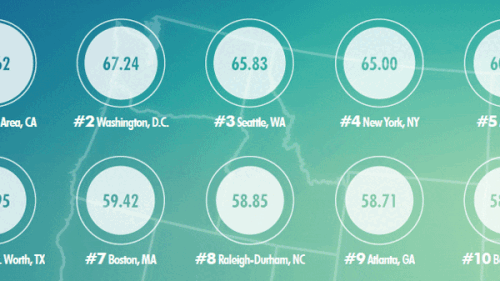Economy, Market & Trends
A new “Housing Developers Toolkit” released by the White House outlines a range of zoning and local policy changes that can spur development of affordable housing. Among them are the elimination of off-street parking requirements, which the paper states “generally impose an undue burden on housing development, particularly for transit-oriented or affordable housing.”
Some gaps remain in the access to and availability of technology in parts of U.S. cities, and ULI’s recent J.C. Nichols Forum highlighted some newer and emerging tech applications to bridge the digital divide.
The middle tier of U.S. cities—places like Kansas City, Missouri—may have lower populations, fewer cultural offerings, and less cosmopolitan flair than bigger cities, but they also have their own advantages over the behemoths.
Many observers are wondering how Cuba and its economy will react to the opening of relations with the United States, and Richard E. Feinberg, a senior fellow in the Latin America initiative at the Brookings Institution, explores the question in his book Open for Business: Building the New Cuban Economy.
National Public Radio’s podcast Planet Moneyrecently looked at why demolishing a single block of abandoned homes in Baltimore took more than a decade.
San Francisco remains the leading U.S. tech market, but the competition for talent is getting tougher as more highly skilled tech workers—especially millennials—are flocking to cities where the cost of living is lower and tech jobs are plentiful, according to CBRE Group’s annual research report Scoring Tech Talent. Austin and Dallas/Forth Worth ranked fifth and sixth respectively in this year’s report.
An attorney by training and chair of the Department of Valuation and Taxation at the Lincoln Institute of Land Policy, author Joan Youngman presents a crisp and balanced review of the complex administrative and political challenges posed by the assessment and collection of the annual property tax.
This past May, ULI Boston released a report, Building for the Middle: Housing Greater Boston’s Workforce, which spotlights a troubling phenomenon—a 25-year decline in the number of middle-income households in Greater Boston, which occurred while the number of low- and high-income households rose significantly.
Affordable housing means many different things across the Asia Pacific region, but in every nation, the driving issue in its provision is the cost of land. That should come as no surprise; the Asian population of 4.3 billion represents 57 percent of the world total, according to United Nations data, but Asia has only 30 percent of the world’s land mass.
Technology tenants’ leasing volume is at a historic high. But you have to negotiate leases differently when a tenant wants a climbing wall, dense occupancy ratios—and a welcoming attitude toward dogs and bicycles.






